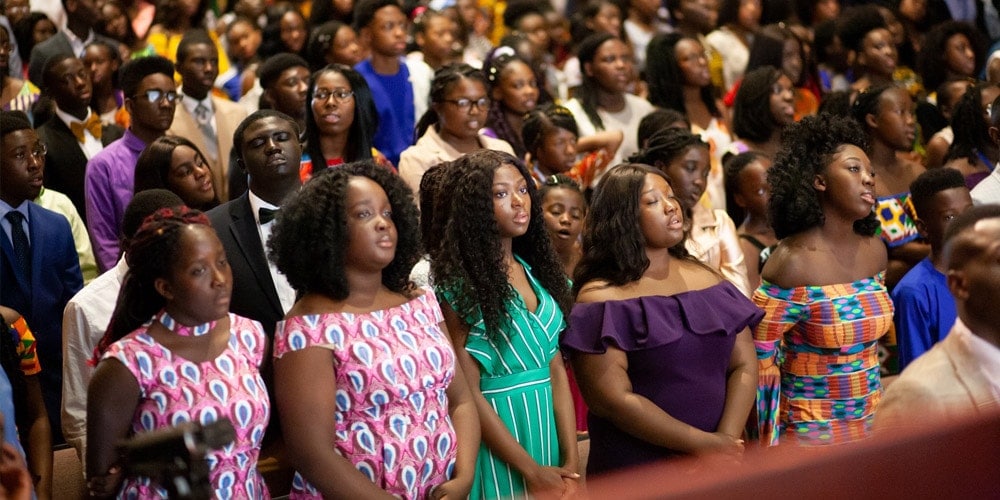
Leaders of North America Ghanaian Seventh-day Adventists (NAGSDA) held the organization’s Fall Conference in Columbus, Ohio, United States, to develop a strategic plan for the next five years, quickening the pace of sharing the gospel and reviving church members across the region.
The three-day event that took place October 25-27, 2019, brought attendees from the Ghanaian Adventist churches in the United States and Canada. Church pastors who lead Ghanaian Adventist congregations also attended.
NAGSDA executive secretary Derrick Adu Asare led the Friday-morning devotion, followed by prayers. Then NAGSDA president Appiah Kubi Kwarteng introduced a discussion on the 2019-2024 strategic plan. Five groups were formed that brainstormed ideas for NAGSDA’s future.
Ministry priorities for 2019-2024 centered on evangelism, youth and young adults, financial viability, education, and Ghana projects. Each of the five groups was assigned one of those core areas. Then they came up with reports that included goals and action plans.
Growth and Dedication
Keynote speaker Emmanuel Osei, pastor of First Ghana Church in New York and the ministerial director of NAGSDA, took time to acknowledge the contributions of some laymen, especially their pioneering roles in planting churches in North America. He recounted the history of Ghanaian Adventist churches, which began in the 1980s, and how the laity sacrificed their time before the clergy came in. “We should not forget to honor such dedicated people,” he said.
In his sermon, Osei called delegates to be holy, dedicated, and committed. “Please, do God’s work with a clear conscience,” he said.
“God has called us in such a time like this to strategize,” Osei added. “Leaders should be holy because they are role models. God is using you for a purpose because you are called by God.”
Osei shared the importance of commitment to Christian leadership. “Dedication without commitment is deception,” he said.
An Active Organization
Kwarteng gave a condensed report on NAGSDA’s past activities.
On evangelism, Kwarteng reported that NAGSDA has invested significantly in evangelistic programs in North America and Ghana. For youth and young adult development, NAGSDA has been supporting the Collegiate and Young Professionals (CYP) Conference. He admitted, however, that in the area of education, not much has been done.
During the five planning groups’ reports, each chair of the committee gave an overview and the goal of the group. The evangelism group listed church planting, revivals, evangelism training, and youth training programs. The committee on the youth and young adults came out with action plans that included the need to involve children and young people in church programs.
“If we are considering some ways to support and develop the youth, then we have to involve them at the planning stage,” said Paul Yeboah, a founding member of NAGSDA and a church planter.
Charles Boampong and his group members, who discussed financial viability, recommended that NAGSDA should be promoted at the local church level. The education group, led by Isaac Gyamera, proposed scholarships to support students and promotion of trade and vocational training in churches, among other initiatives.
The Ghana Project committee chaired by Emmanuel Bediako opened up the opportunity for delegates to suggest some possible projects that NAGSDA could undertake. Some attendees suggested putting up church buildings and the adoption of existing churches.
“We should engage in relevant mission projects to attract donor support,” said Kwame Owusu Brobbey, who pastors a Ghanaian church in Toronto, Ontario, Canada. “Any attempt to start an unrealistic project will not bring the needed support.”
After all the groups’ reports, a committee was set up. It was tasked to come up with a final strategic plan document by taking into consideration the proposals from the various groups.
Final Charge and Feedback
Isaac Gyamera delivered a closing message during the consecration service. He charged the attendees to recognize their divine appointment.
“God has given Christian leaders a chance to be eagles, so don’t behave like chickens,” Gyamera said. “Please go home and work as people who have been called.”
Feedback from the event was extremely positive.
“I am glad that as a body, we could review the objectives set up years ago and find ways to accomplish what was still outstanding,” said Daniel Opuni Mensah, an attendee from Riverside, California, United States. “I was extremely happy with the devotional messages reminding us that what the Lord requires is our willingness and dedication to his work.”
“The ideas that people shared at this meeting are laudable,” added Bernard Quayson, a doctoral student from Andrews University in Michigan and a delegate. “What is most important now is the final strategic document and its implementation.”
It is estimated that there are more than 5,000 Ghanaian Seventh-day Adventist members in 40 congregations across the North American Division. In summer 2019, more than 1,900 people attended the NAGSDA camp meeting held in Pennsylvania.
NAGSDA’s Constitution states that “congregations that comprise NAGSDA are member churches of their respective local Conferences and Union Conferences.” It is essential to foster healthy relationships with the local conference, union, division, and the worldwide church, leaders said.